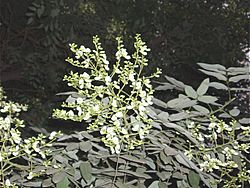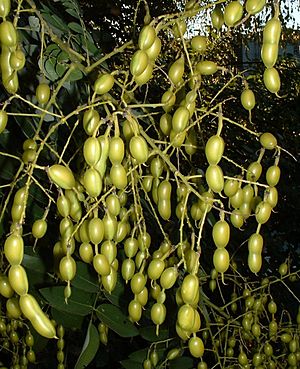Japanese pagoda tree facts for kids
Quick facts for kids Styphnolobium |
|
|---|---|
 |
|
| Sophora japonica flowers (Styphnolobium japonicum) | |
| Scientific classification | |
| Kingdom: | |
| Division: | |
| Class: | |
| Order: | |
| Family: | |
| Subfamily: | |
| Tribe: | |
| Genus: |
Styphnolobium
|
The Pagoda Tree or Chinese Scholar Tree is a group of plants known scientifically as Styphnolobium. These plants are a type of flowering plant and belong to the Fabaceae family, which is also known as the pea family.
There are 9 different kinds, or species, of plants in the Styphnolobium group. These plants were once part of another group called Sophora, but scientists later decided they were different enough to have their own group.
Contents
What is Styphnolobium?
Styphnolobium is a genus of plants. In biology, a genus is a group of closely related species. Think of it like a family name for plants. All the plants in the Styphnolobium genus share many similar features.
The Pea Family Connection
The Styphnolobium plants are part of the Fabaceae family. This is a very large family of flowering plants, often called the pea family or legume family. Many plants we eat, like peas, beans, and lentils, belong to this family. Plants in the pea family are known for their special seed pods, which are called legumes.
Why the Names Pagoda Tree and Chinese Scholar Tree?
The common names, Pagoda Tree and Chinese Scholar Tree, come from the plant's history and use. The Pagoda Tree is often planted near temples and pagodas in Asia. The name Chinese Scholar Tree suggests its importance in Chinese culture, possibly linked to places of learning or respected individuals.
Plant Classification
Understanding how plants are classified helps us see how different living things are related. Styphnolobium fits into the big picture of life like this:
- Kingdom: Plantae (All plants)
- Division: Magnoliophyta (Plants that produce flowers)
- Class: Magnoliopsida (A large group of flowering plants)
- Order: Fabales (An order within the flowering plants)
- Family: Fabaceae (The pea family)
- Subfamily: Faboideae (A smaller group within the pea family)
- Tribe: Sophoreae (An even smaller group)
- Genus: Styphnolobium (Our specific group of plants)
This classification system helps scientists organize and study the millions of different living things on Earth.
See also
 In Spanish: Sófora para niños
In Spanish: Sófora para niños


